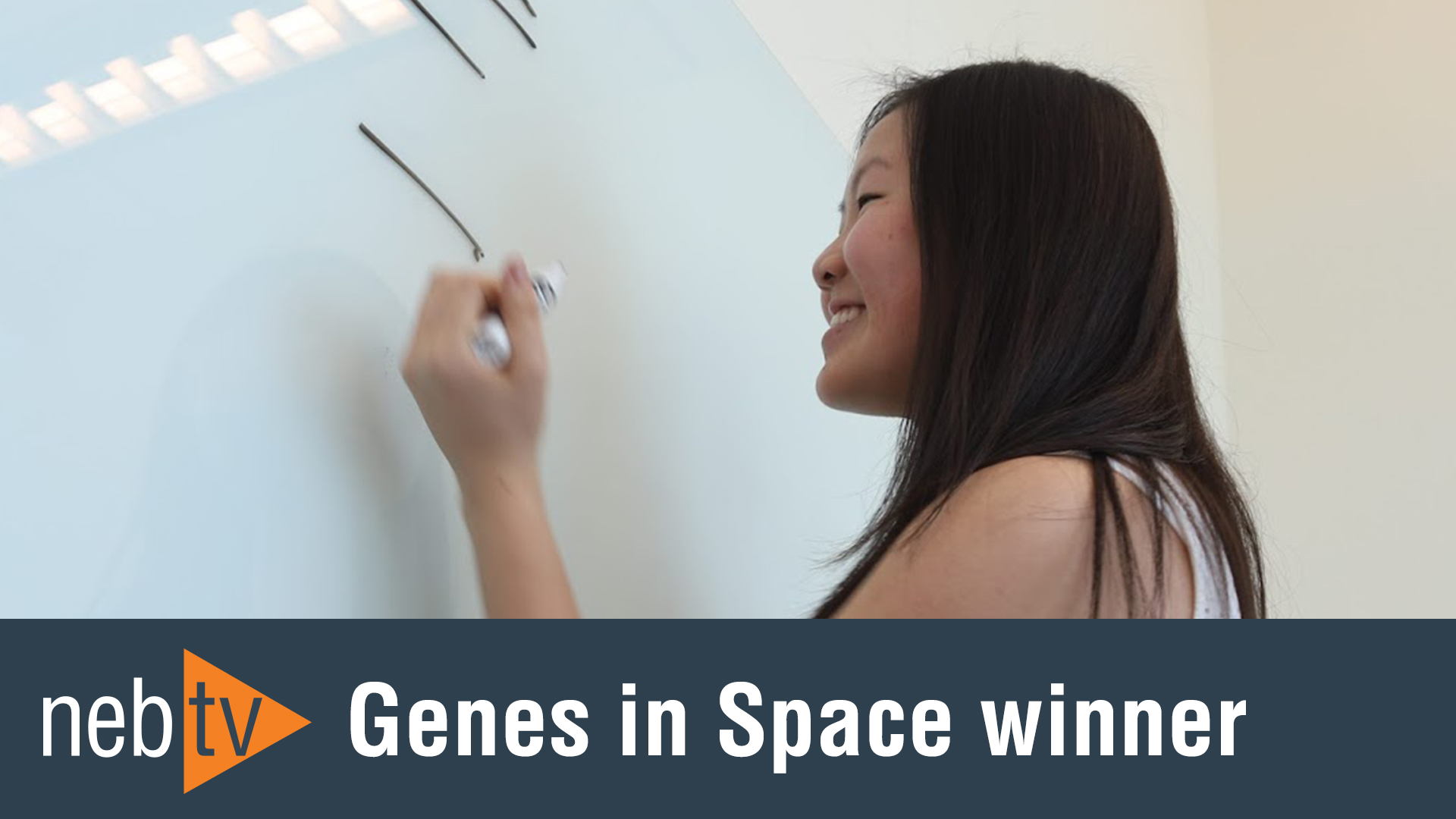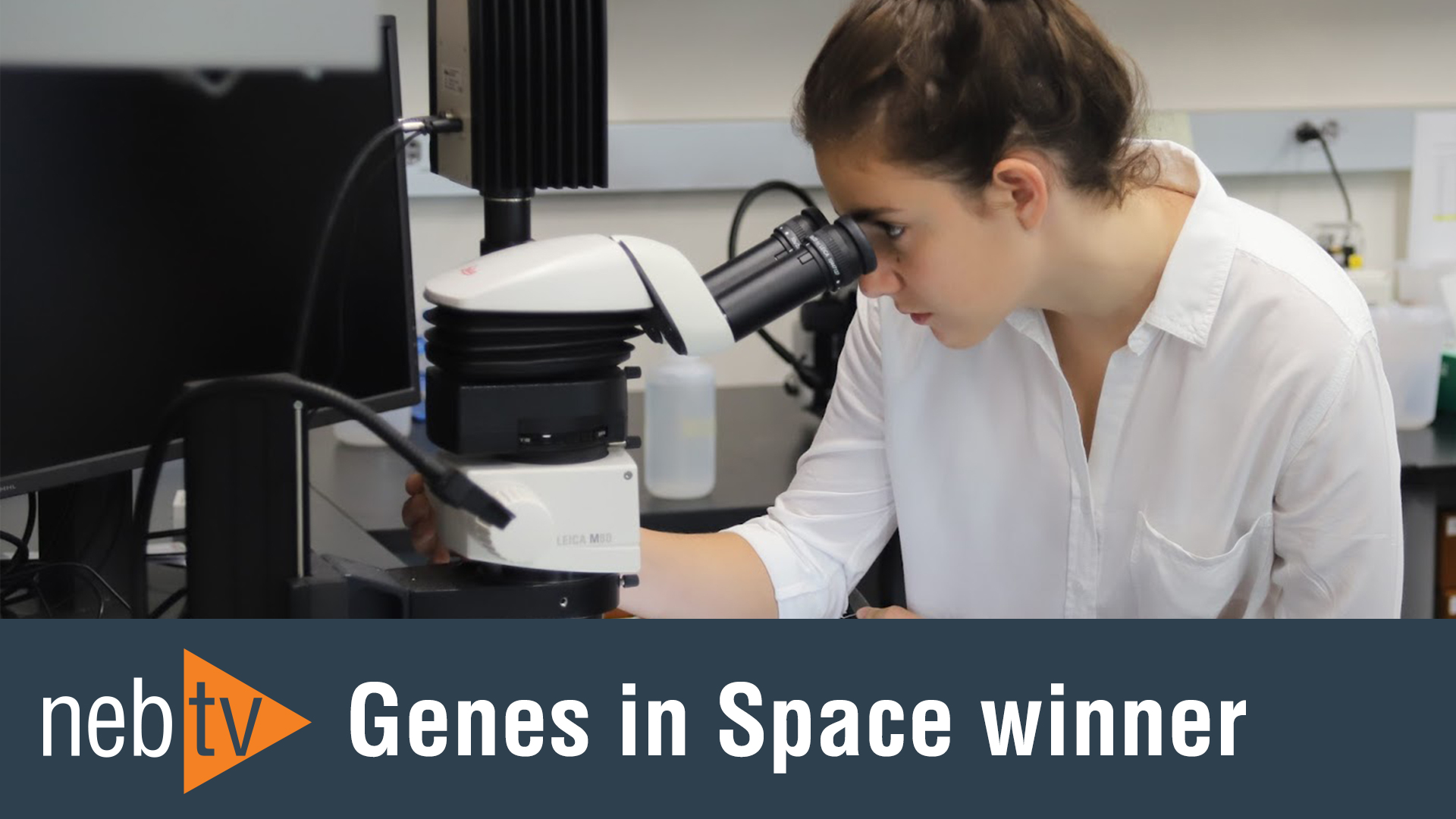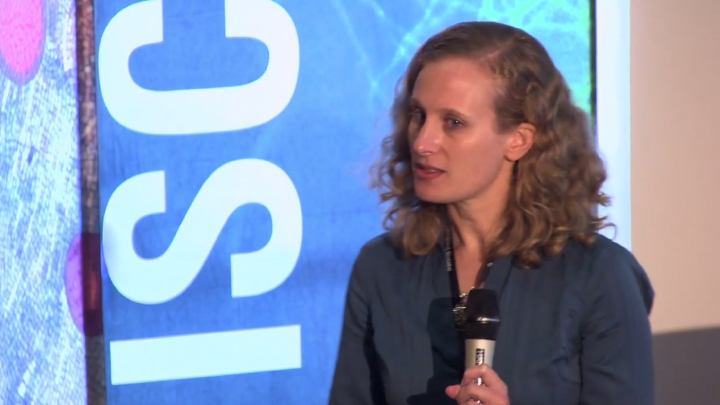NEB® TV Ep. 10 – Genes in Space
Script
NEB TV: What's trending in science.
Deana Martin:
Welcome to NEB TV. Today I'm joined by Nicole Nichols, who is a group leader for one of our product development teams. Hey Nicole.
Nicole Nichols:
Hello!
Deana Martin:
And we're talking about Genes in Space. In our Science in Sixty, Nicole will tell us a little bit about the Genes in Space initiative, then we will speak to one of the founders of miniPCR, who will give his perspective on Genes in Space and talk about the first awards event, and then we'll hear from the first Genes in Space winner, Anna-Sophia Boguraev. She'll tell us about the whole awards process and what it felt like to have her experiments sent up into space.
Deana Martin:
Are you ready?
Nicole Nichols:
I'm ready!
Deana Martin:
Okay!
Science in 60:
Nicole Nichols:
Genes in Space is a contest that was originally conceived of by miniPCR and Boeing and has been co-sponsored by Center for the Advancement of Science in Space, or CASIS, FedEx, Math for America, and New England Biolabs.
The Genes in Space contest was opened to students from the seventh to twelfth grades and the first winner, the winner of the 2015 contest, was Anna-Sophia Boguraev. She was a high school student from New York. She designed experiments to evaluate the effects of microgravity on epigenetics and astronaut immune systems. She was on-hand at Cape Canaveral to watch her experiments launch up to the International Space Station aboard a SpaceX-8 resupply mission; the Dragon module. While they were up on the Space Station, it was European Space Agency astronaut, Tim Peake who actually conducted the very first PCRs in space.
We've been very humbled and very thrilled to have played even a small part in all of the work that's gone on to bring about the very first PCRs in space.
Genes in Space: an overview
Ezequiel Alvarez.-Saavedra, PhD:
The Genes in Space Program started as a collaboration between Boeing and miniPCR. We met at MassChallenge and Boeing was looking for interesting ideas on experiments to send to the International Space Station.
We were really pleased with the breadth and depth of the quality of the applications. We received applications from grades seven through twelve. The finalists of the Genes in Space Competition get mentoring for two months from PhD from MIT in Harvard. They get to travel to International Space Station conference to present their research. They receive a DNA discovery system, which is a biotech toolkit for their classrooms or homes. They receive a medal, and the winner, in addition, receives a very nice trophy that is presented by an astronaut at the International Space Station conference. They get to go to New England Biolabs to do the space camp to prepare their experiment and obviously they get to travel to see the launch of their experiment and they participate as the principal investigator in a NASA investigation.
So in April of this year we traveled to Cape Canaveral with Anna-Sophia and her family, and the whole team from Genes in Space. It was an incredible moment to be able to be there up close and see the rocket launch and know that inside that rocket is your little strip with tubes that will perform the first PCR experiment in space, ever.
We're currently in the final stages of the second Genes in Space competition. We have over 15 hundred individual students participated already and we expect them to get bigger as more people know about it. Now hopefully this is a long-standing interest that will encourage them to pursue careers in STEM.
If you're interested in applying to the Genes in Space competition, go to the genesinspace.org website where you can enter and you can also sign up for a newsletter where we keep you updated on the latest happenings.
Anna-Sophia Boguraev:
Hi, I'm Anna-Sophia Boguraev, I'm from Bedford, New York, and I am the winner of the 2015 Genes in Space contest. So, after finding out that I was the winner, I had the experiment and it looked great on paper. I wasn't aware of what technology we actually had on the International Space Station, so I wanted to do a proof-of-concept first, so that's what I ended up doing, was a proof-of-concept for basically ... is bisulfite converted DNA going to survive and amplify correctly? And if it does work in space then we can look to make sure that astronauts in the future potentially don't get sick; don't have the genetic abnormalities that they may be experiencing in space now.
So we used a modified version of Q5 so we were in contact with scientists from New England Biolabs to kind of establish how that was going to work. Because everything had to go to space, there was a lot of sitting around, so we had to make sure all the enzymes and everything was stable, sitting around for weeks on end because you don't usually leave samples sitting for weeks and we wanted to make sure that wasn't going to degrade the DNA, degrade the enzyme, degrade the whatever else was in the tube. So, we had to ensure that that worked. And then I was working almost direct with people from miniPCR the entire time.
Being in Florida was kind of surreal only because I've been watching rocket launches on the little NASA TV on my computer for a few years now and I was actually there watching a rocket launch, and just being there was a really good experience.
When the samples came back, they came down with the Dragon Capsule, dropped in the Pacific Ocean, got picked up by a boat, brought back to California, California shipped them to Houston where we were working with a group in Houston and they prepared them to be packaged and then they were sent to miniPCR, and then I met miniPCR here and we all have the samples here at New England Biolabs.
Today what we did was the final step in the analysis, and that was essentially taking the earth samples that we've had here since we prepared them, and the space samples which we just got back and running them out simultaneously to see if they ended up looking the same or not. We've analyzed them and we're going to be presenting the results at the next ISS R&D conference in San Diego in July. And from that point on, we'll be able to see what we can do with PCR in space.
I think that the potential that exists in the people who are now just starting to enter into the ... just starting to work on space, just starting to think about it; we have all the solutions packed somewhere in our collective mind, and I think between all of us, hopefully I'll be a part of it, between all of us we're definitely going to figure out how to work this out.
Deana Martin:
Nicole, thanks so much for joining us today.
Nicole Nichols:
Oh you're very welcome. It was a lot of fun.
Deana Martin:
Good and as always, if you have any suggestions for future episodes, please let us know.
Related Videos
-

Genes in Space winner Sophia Chen -

Genes in Space winner Liza Reizis -

GO GIRL: Promoting girls in STEM

